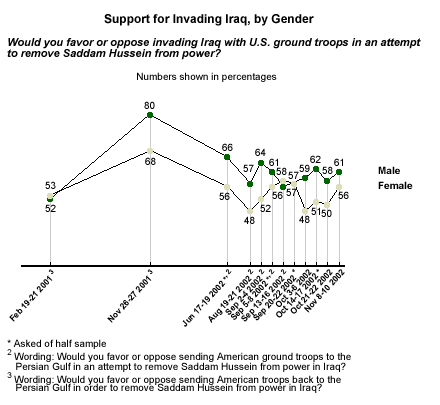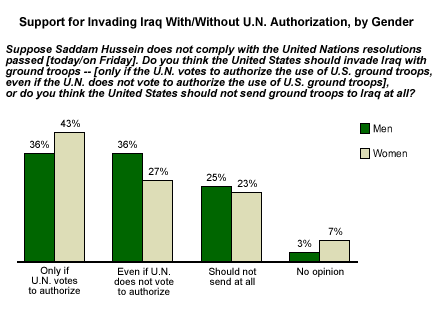Polling conducted during the past four decades has shown that typically, men favor the United States' going to war to resolve disputes much more than women do. In the recent debate over a possible U.S. invasion of Iraq to remove Saddam Hussein from power, the gender gap has varied considerably, and is now at a modest five points. On a related question -- whether the United States should take action if the United Nations does not give its authorization -- the gender gap is somewhat larger, with men more likely than women to say the United States should go it alone.
Previous Gender Gaps on War Issues
In the early stages of military conflict, women have usually expressed less support for military action than men have. In a 1965 poll, for example, 73% of men, but only 59% of women, said the United States should continue its "present efforts" in Vietnam. A January 1991 poll found that 60% of men, but only 45% of women, favored U.S. military action to drive the Iraqis out of Kuwait. In February 1998, when Saddam Hussein was refusing to let U.N. weapons inspectors into his country, men were evenly divided as to whether the United States should continue diplomatic efforts to resolve the issue or take military action. Women, by contrast, opted for diplomatic over military action by a 25-point margin, 59% to 34%.
Gender Gap Varies on Iraq
The most recent poll* shows only a five-point gender gap, with 61% of men and 56% of women favoring an invasion of Iraq to remove Saddam from power. However, that gap has varied considerably over the past 2 years.

In February 2001, long before President George W. Bush began building his case for action against Iraq, about the same percentages of men (52%) and women (53%) supported military action to remove Saddam Hussein from power. Several months later, after the Sept. 11 terrorist attacks, men were much more eager than women were, by a margin of 80% to 68%, to go after Saddam. A 10- to 12-point gap persisted into the beginning of September 2002, but the gap vanished in the last two September polls amid intensified public debate on the issue. An 11-point gap re-emerged in October 2002, as support among women declined and support among men remained constant. The smaller gap in the latest poll mostly reflects higher support among women, similar to the pattern of opinions measured in September.
U.N. Authorization to Attack Iraq
The recent U.N. Security Council Resolution demands that Iraq submit to rigorous weapons inspections or face "severe consequences." Should Iraq not fully comply with the resolution, the U.N. Security Council will then decide whether to authorize a U.S.-led attack on Iraq. Overall, 40% of Americans say the United States should attack only if the United Nations gives its authorization, while 31% would be willing for the United States to act without U.N. support.
On this question, there is a modest gender gap. Men divide evenly between a go-it-alone strategy and waiting for U.N. authorization, with 36% taking each position. Women, on the other hand, favor waiting for the United Nations by a 43% to 27% margin.

Men and women are about equally likely to say that if the United Nations were to authorize a military attack, they would then approve of such action: 72% of men and 70% of women express this view. About a quarter of each group, 25% of men and 23% of women, oppose an attack on Iraq regardless of U.N. authorization.
*Results are based on telephone interviews with 1,014 national adults, aged 18 and older, conducted Nov. 8-10, 2002. For results based on the total sample of national adults, one can say with 95% confidence that the maximum margin of sampling error is ±3%. In addition to sampling error, question wording and practical difficulties in conducting surveys can introduce error or bias into the findings of public opinion polls.
